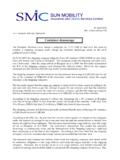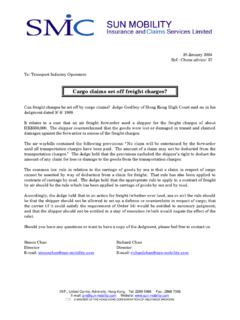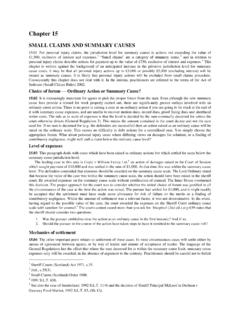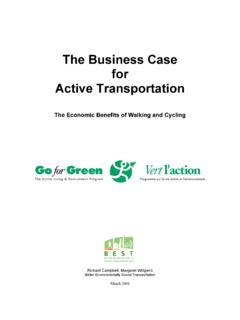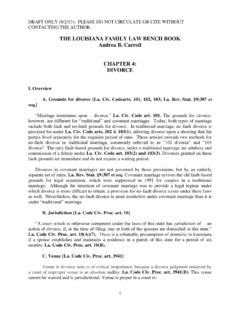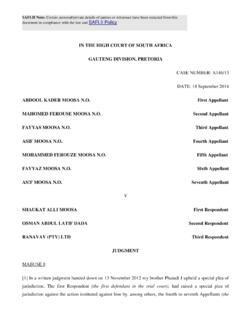Transcription of Malaysian jurisdiction clause - Sun Mobility
1 28 April 2006 Ref : Chans advice/64 To: Transport Industry Operators Malaysian jurisdiction clause In its Judgment of 15/3/2006, the Hong Kong District Court refused to grant a carrier a stay despite the existence of a Malaysian jurisdiction clause in the contract of carriage. Mr Tung was a passenger on board the "Superstar Leo" ("the Vessel"), a cruise liner operated by Star Cruises (HK) Limited ( Star Cruises ), on a 6-day Hong Kong/Shanghai excursion voyage departing from Hong Kong on 18/8/2002. The trip was booked by Mr Tung through Star Cruises' booking agent over the telephone on 12/6/2002. After the telephone call, Mr Tung faxed to Star Cruises his personal particulars and that of his family together with a photocopy of his credit card.
2 Later on the same day, Mr Tung received, also by fax, a confirmation slip and a receipt issued by Star Cruises. It was stated on the confirmation slip that the same should be presented upon check-in in exchange for the boarding passes. Towards the bottom of the confirmation slip there were some printed terms under the heading "Important Note". Some of these terms were given slightly greater prominence by way of capital prints, including clause 9 which read as follows: "CONTRACT IS SUBJECT TO THE TERMS AND CONDITIONS OF CARRIAGE OF THE OPERATOR AND OWNER." The Terms and Conditions referred to in clause 9 were nowhere to be found on the confirmation slip. It was however Star Cruises case that these Terms and Conditions were readily available to any passenger upon request at the time of reservation, or on the website of Star Cruises any time before departure.
3 The two particular terms and conditions that fell to be considered were Conditions 22 and 25: "22. jurisdiction clause The Passenger and the Carrier irrevocably agree to submit any and/or disputes and matters whatsoever arising under, in connection with or incidental to the Passage Contract or the service thereunder provided by the Carrier to the exclusive jurisdiction of either the Courts of Singapore or the Courts of Malaysia at the sole option of the Carrier. 25. Choice of Law clause All Passage Contract and these terms and conditions shall be governed by and construed in accordance with Malaysian law." It was Mr Tung's case that at around 4 pm on 18/8/2002, while he and his family were touring around on the Vessel, he slipped on a patch of water on the bow deck and sustained injuries.
4 Mr Tung received some medical attention by a doctor stationed on the Vessel. Upon arrival in Shanghai, he was sent to the hospital where he was diagnosed to have fractured ribs over the left lower chest. Upon his return to Hong Kong on 23/8/2002, he was immediately admitted into Pamela Youde Nethersole Eastern Hospital ("PYNEH") where he was hospitalized for 3 days. After discharge Mr Tung was followed up on a regular basis at the surgical department of PYNEH and was granted sick leave up to August 2003. He was also referred to the Southorn Centre of Tang Shiu Kin Hospital ("TSKH") for physiotherapy and psychiatric treatment. Mr Tung was an Assistant Officer I at the Correctional Services Department at the time of the accident.
5 Apart from loss of earnings, loss of earning capacity, medical expenses and other special damages, Mr Tung also claimed that he had suffered loss of promotion prospects as a result of the accident. Mr Tung issued the writ in Hong Kong jurisdiction on 12/1/2005. By a letter dated 10/6/2005, Star Cruises through its solicitors requested Mr Tung to discontinue his claim by reason of (1) the exclusive jurisdiction clause , and (2) the time-bar stipulated under Conditions 5 and 20 of the Terms and Conditions. In the same letter, Star Cruises solicitors also gave notice to Mr Tung's solicitors that Star Cruises was opting for the Malaysian courts as opposed to the courts of Singapore pursuant to the exclusive jurisdiction clause .
6 Star Cruises referred to a number of well-known English 'ticket cases' and submitted that a passenger would be bound by the terms of the contract of carriage, including those incorporated by reference, on the acceptance of the ticket ( the confirmation slip) as long as reasonable notice had been given. In the classic decision of Thompson v. London, Midland & Scottish Railway Co. [1930] 1 KB 41, Sankey at 55 succinctly summarised the principle as follows: "I rather think that this is a class of case where you make a contract in one document which clearly refers to conditions and incorporates conditions which are contained in another document, and if you do make a contract like that I do not think it is open to you to say either: (1.)
7 That you did not in fact look at the document which contained the incorporated terms; or (2.) that the document which contained the incorporated terms was one which you might have had some difficulty in finding. The fact remains that you had made a contract which clearly says that the conditions are contained in a particular document." The Court accepted Star Cruises' submission that if Mr Tung was unhappy with the introduction of the Terms and Conditions, it would have been open to him to reject the offer of Star Cruises and to refuse to be bound by them before he boarded the Vessel some two months later. Mr Tung further submitted that unlike the Thompson case, the confirmation slip did not contain any reference as to where the Terms and Conditions might be found.
8 He relied on the observation made by Sankey LJ (at ) that where the conditions sought to be incorporated were so unreasonable that nobody could have contemplated their existence, the other party should not be bound by such conditions unless special attention had been drawn to them. The Court did not consider the exclusive jurisdiction clause to be so onerous that exceptional steps should have been taken to bring it to the attention of Mr Tung. The Court took the view that clause 9 of the confirmation slip constituted sufficient notice of the Terms and Conditions and therefore both the exclusive jurisdiction clause and the choice of law clause formed part of the contract between Mr Tung and Star Cruises.
9 Mr Tung had an alternative objection on the ground that the Terms and Conditions were invalidated by the Unconscionable Contracts Ordinance, ("UCO"). Besides objecting to the inclusion of the Terms and Conditions generally on the ground that there was 'an imbalance of bargaining power' and 'failure to reveal the severity of the terms' to the consumer, Mr Tung mounted his attack in particular on the following features: (1) the claimant would be required to bring his claim in a strange and distant country in accordance with the law of a place which had no connection with him whatsoever (Conditions 22 and 25); (2) the claim would be subject to a two-year limitation period (Conditions 5 and 20).
10 And (3) the liability of the carrier was limited in accordance with certain limitations imposed by the Athens Convention (Condition 5). The second and third complaints might be disposed of quickly. The 1974 Athens Convention was extended to Hong Kong by the Merchant Shipping (Limitation of Shipowners' Liability) Ordinance, The two-year limitation period and caps on liability, if applicable, would be available to Star Cruises irrespective of whether Malaysian or Hong Kong law should apply. It was interesting to note that the relevant limit of liability under Article 7 of Schedule 1 of the Ordinance ( 46,666 SDR) was in fact lower than that of Condition 5(a)(ii) of the Terms and Conditions ( 175,000 SDR), as Hong Kong was not a party to the 1990 Protocol which amended the Athens Convention by substituting an enhanced compensation limit under Article 7.







